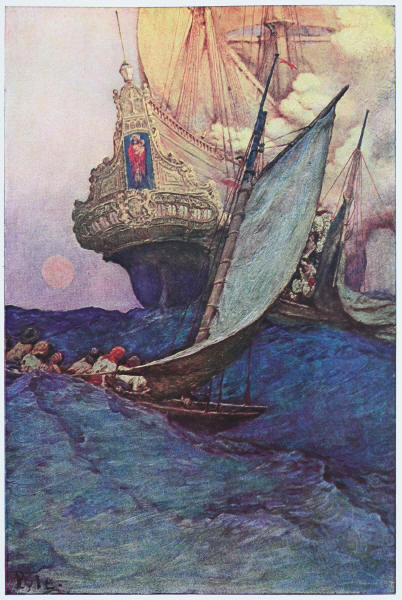
CYBERPIRACY - Why registering or owning internet domains names can be illegal
In 1997, the United States Congress enacted the Anticybersquatting Consumer Protection Act ("ACPA"). This Act is a part of the Lanham Act, which protects against trademark infringement and unfair competition and prohibits illegal registering, holding, using, offering for sale, selling or requesting payment in connection with an internet domain.
What is a Trademark? A trademark is any word, term, name, symbol, slogan, package design product configuration, or device, or any combination thereof, used to identify goods and/or services and distinguish them from others in the market place or in trade. Even a sound, color combination, fragrance or hologram can be a trademark under some circumstances. The term trademark is often used interchangeably to identify a trademark or service mark.
Why is owning this domain wrong? A domain name which incorporates the trademark of another may be an infringing or illegal domain name. Trademarks are valuable rights to their owners and federal law fully protects against the infringing use of those marks by others. Use of mark as a part or whole of a domain name can constitute trademark use. Federal law provides for immediate injunction against infringing use (without the necessity of a trial) and also provides for statutory damages of up to $100,000 per domain.
What can happen to me? Plain and simple, involvement in illegal internet domains can cost dearly, ruin a business, and/or destroy a reputation. Some recent Court decisions have also held the following:
Half Million Dollar Mistake: On October 30, 2000, the United States District Court for the Eastern District of Pennsylvania ordered Defendant Zuccarini to pay statutory damages of $500,000 (plus $30,653 in attorneys' fees and costs) arising from five domain names he acquired and used in violation of the Act.
barbiesclothing.com: The United States District Court for the Southern District of Ney York found that Defendant in Mattel v. Adventure Apparel violated federal law by registering the domain names "barbiesbeachwear.com" and "barbiesclothing.com," even though the accused party had sold only $10 in merchandise via the infringing domains. A court order was entered against the Defendants, the domains were taken away and the the Defendants were ordered to pay damages to Mattel, the holder of the BARBIE trademark.
earnestandjuliogallo.com: In E. and J. Gallo Winery v. Spider Webs Ltd., et al., the United States District Court for the Southern District of Texas entered an injunction against the Defendants preventing them from continuing to use the domain name ernestandjuliogallo.com, and ordering the transfer of the domain to plaintiff E. and J. Gallo Winery ("Gallo"), which holds a trademark in the mark "Ernest and Julio Gallo." The court required the Defendants to pay damages under the Anticybersquatting Consumer Protection Act, even though the Defendants used their web site simply to public commentary and articles critical of alcohol consumption.
Injunction and damages: In International Bancorp, L.L.C. v. Societe des Bains de Mer et du Cercle des Etrangers a Monaco, the United States District Court for the Eastern District of Virginia entered judgment against the Defendant for registering a domain name that incorporated the “Casino de Monte Carlo" name into the domain. In addition, the Court ordered the accused party to pay $100,000 in damages.
The statistics heavily favor the trademark owner: Since the enactment of this Act, over 1,000 decisions have been issued, seventy-seven percent of which were in favor of the trademark owner.
How does a court determine bad faith? A court is likely to decide that a domain name registrant acquired or used the name in bad faith if the motive to register the domain was commercial gain, if s/he sought to divert customers from a trademark owner to another that, either for purposes of commercial gain or to tarnish the mark, could harm the goodwill belonging to the trademark owner. If someone is deriving commercial gain because of, in part, the presence of another's trademark in a domain name, a court may find that to be evidence of bad faith. A court will almost certainly find bad faith if the domain name holder attempts to sell, rent, license, or charge other fees, to either the trademark owner or someone else, without having used it or without intending to use it, or having used it improperly. A court is also likely to find bad faith if the name holder provides false or misleading identification information when applying for registration, or if the holder fails to accurately update this information. A court will also frown upon a prior history of registering domains containing the trademarks of others. Finally, a court is likely to find bad faith if the person registers a number of names which are identical or similar to trademarks.
I registered the domain first. Why can't I keep it? Being the first to register a domain name does not grant special protection if the domain violates the law. The internet is no different from any other environment when it comes to using trademarks which belong to someone else. The question is not who registered the domain first, but rather, does the trademark in the domain name belong to someone else? Consider whether using that trademark in a "non electronic" forum would violate the trademark owners rights. Because the use occurs "on the internet" does not make it lawful.
The domain I own is different! Why am I being accused? Trademark law requires only that there is "confusing similarity" between the trademark and the accused domain name in order to find infringement. Corrupted spellings, phonetic similarities, "typo" spellings, meaning equivalents, can all count as confusingly similar according to the law. For example, the following domain names have been found to be confusingly similar with the complainant's trademarks:
| THIS "DIFFERENT" DOMAIN WAS | RULED CONFUSINGLY SIMILAR TO THIS TRADEMARK |
| americanonline.com | AMERICAONLINE |
| aolgirls.com | AOL |
|
homail.com |
HOTMAIL |
|
hotmai.com |
HOTMAIL |
| jahu.com | YAHOO!, |
| youhoo.com | YAHOO!, |
| ticktmasters.com | TICKETMASTERS |
| bostonyahoo.com | YAHOO!, |
What now? Although a domain dispute can lead to great expense, and the incurring of substantial attorney fees, it may be that the person sending notice of the problem may be agreeable to resolving the matter in a simple way and at relatively little cost. In this regard, the transferring of the disputed domain to the party who hold the trademark rights, may resolve the matter completely.
Initiating a domain transfer - how it works. The domain's registry (netsol.com, register.com, dotster.com, godaddy.com, etc.) all have simple procedures for transferring a domain, The procedures can be accessed by visiting the registrar's web site, then selecting "transfer domains".
____________________________________________________________________________________________________
Trademarks ·
Unfair Competition · Trade Secret · Copyright · Anti-counterfeiting and Anti-cyberpiracy · Litigation · Internet Law · Art & Entertainment
![]()
© Copyright 1995, 2023 WHITELAW LEGAL GROUP. All Rights Reserved. Market Intelligence® , The Law of Creativity™, The Law of Innovation™, The Science of Art ® , Business at the Speed of Thought ® , and the design imagery noted ® or ™ are trademarks of
WHITELAW LEGAL GROUP


